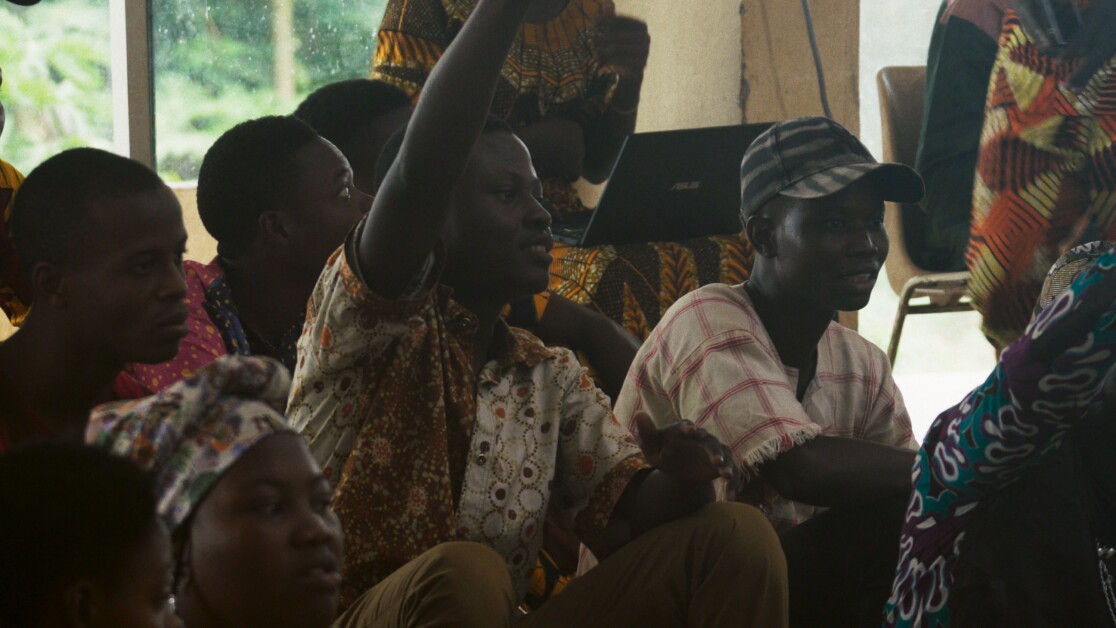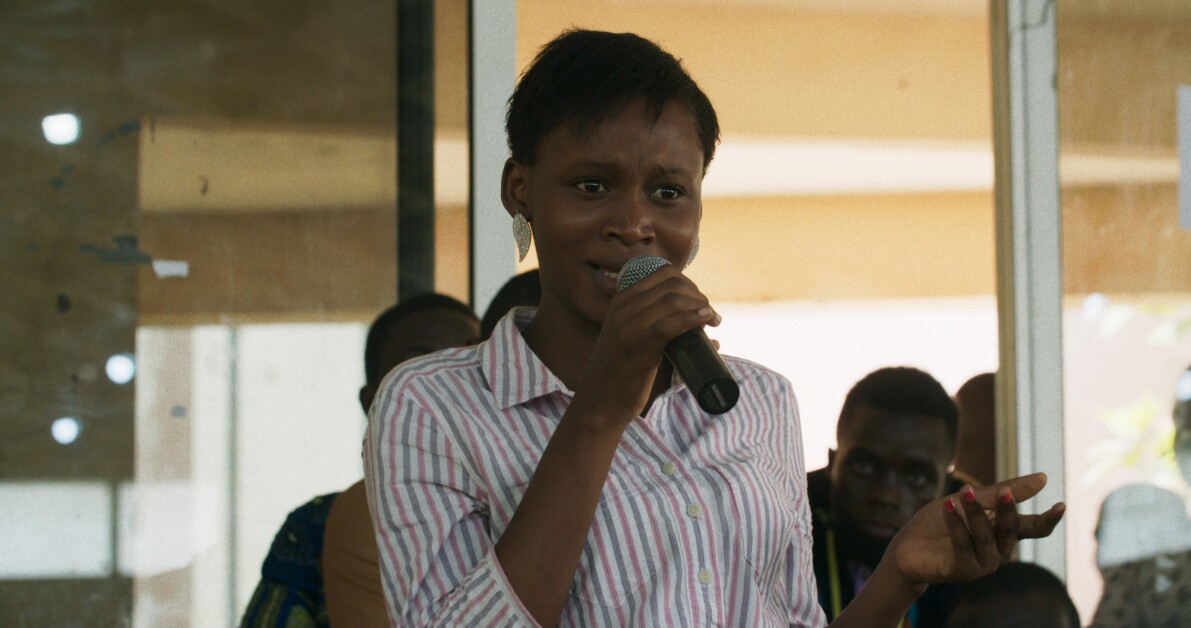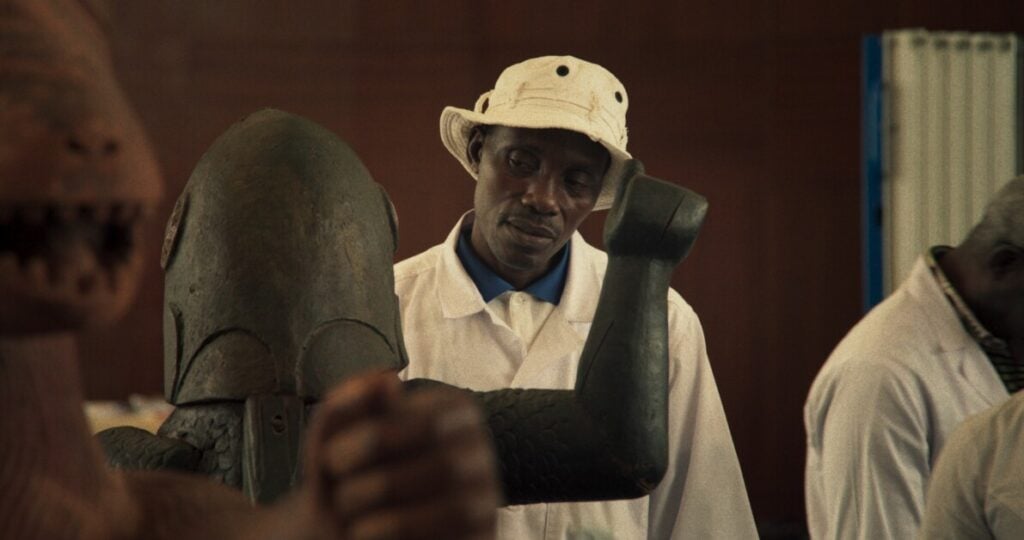Cultural preservation is very mundane.
That is one of the first takeaways that Mati Diop offers in Dahomey, her film documenting the restitution of 26 artifacts that originally belonged to the African country of Benin (then the Kingdom of Dahomey) and were stolen by colonial France in the late 19th century. We’re first introduced to these artifacts as they’re being packed away in Paris to be flown to their home country. Diop holds the camera steady as the museum workers carefully but dispassionately prepare the works for transport. It is meticulous but uninvolving work and, apart from the visually stunning and culturally resonant pieces themselves, you wonder if this journey has some other meaning than bureaucratic oversight of priceless art.
The answer comes from a mysterious, disembodied voice that speaks over both a black screen and the artifacts’ departure from France. That voice is the spirit of the 26th artifact depicting the Dahomey King Ghézo. Ghézo’s voice gives us an unprecedented perspective into the messy and devastating complexities of colonialism and its ever-lingering impact on the world. The spirit verbalizes confusion, resentment, heartbreak, and introspection over its place in a rapidly changing world that has moved on since it was installed in the glass box of a foreign land. It is a stunning creative exercise on Diop’s part that adds staggering intimacy to the tangible and intangible pain of cultural theft. It’s easy to discount colonialism’s scope in the abstractions of history books and, ironically, documentaries, which provide the benefit of distance and, to some degree, absolution. The voice, in all its rage and sorrow, makes that impossible.

With the distance obliterated, Diop shows cultural preservation when genuine stakes and context are at the center. Dahomey tracks the same meticulous process in reverse when the artifacts arrive in Benin. We see the Beninese museum workers carefully remove the artifacts and examine them, documenting the physical quality of the materials. What elevates the process from the mundanity of the French’s approach is the palpable reverence in the Beninese’s care. You can feel the excitement and admiration leap off the screen as the museum workers thoughtfully and gently unpack each piece. That passion is bolstered by their documentation of the artifacts. The workers not only detail the condition of the pieces, but also the stories behind them: who and what they depict and represent, and their cultural significance. The histories are rich and engaging in their own right, but Diop’s respectful lens emphasizes the repatriation project’s importance to Benin.
That isn’t to say that Dahomey is all celebration and deference, even as people cheer and dance along the artifacts’ route to a museum in Abomey. The film’s second half is built around an impassioned debate by students of the University of Abomey-Calavi about the repatriation and what it really means. It’s the film at its most provocative, where the students aren’t afraid to grapple with the conflicting feelings that King Ghézo’s artifact gives voice to earlier. Some students want to celebrate the return of the artifacts, while others find the number insulting when there are thousands more still in France’s possession. For others, the artifacts’ repatriation is a microcosm of larger structural issues that come with the legacy of colonialism, from French being Benin’s official language instead of an indigenous one to the economic inequality that would limit access to the artifacts’ exhibition for many Beninese.

The debate is searing in a way that feels novel. It’s not just that the conversations are being had in the first place. It’s that they are so achingly honest and thoughtful in their introspection, willing, or even demanding, that participants interrogate their own passive and active complicity in colonialism’s lingering impact on the African continent. The debate is so impactful that the film can feel lopsided, with the first half’s depiction of museum work lacking the same power. And yet, it doesn’t ring as an error but as a necessary and natural imbalance that slots in well with the messiness that the students and King Ghézo are bravely, openly interrogating. Artifact cataloging should pale in comparison to a blistering discussion about the violent, systemic pillaging of a culture for the sake of resources and the dispersion of white supremacy.
Dahomey was screened as part of the Main Slate section at the 2024 New York Film Festival. The film is currently playing in select theaters courtesy of MUBI.
Director: Mati Diop
Rated: NR
Runtime: 67m
A blisteringly honest interrogation of cultural theft and its consequences.
-
GVN Rating 8
-
User Ratings (0 Votes)
0
A late-stage millennial lover of most things related to pop culture. Becomes irrationally irritated by Oscar predictions that don’t come true.






